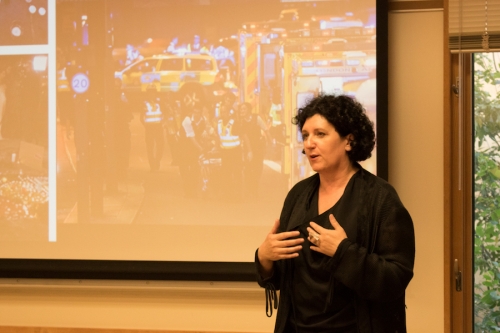
On October 4, the European Union Studies Program at the MacMillan Center hosted a talk by Annemie Turtelboom, 2017 World Fellow and a current member of the Belgian Federal Government. In her lecture on “Security, Migration, and the Future of Europe,” Turtelboom has drawn on her experience as Minister of the Interior, Minister of Migration, and member of the European Union’s Council of Justice and Home Affairs, to discuss some of the most pressing challenges the European project is currently facing.
Among them is a rise in immigration and the refugee crisis which continue to be a salient issue in public debate and a divisive topic within the EU. “Looking at the data, the situation has changed – at this moment in 2015 Europe instead of the United States became the place of migration, a place where people seek refuge,” she said. “Hundreds of years ago Europeans were leaving from the ports of Antwerp to look for a better life in the USA, now it is Antwerp where people immigrate to.”
Turtelboom identified main causes for the surge in illegal migration to Europe as the economic inequality between European countries and those in neighboring regions, high government spending on social security, and a long, hard-to-monitor external sea border of more than 44,000 km.
She has also underlined the importance of acknowledging another geopolitical factor: “When fleeing from a war you will not cross the Atlantic in a rubber boat,” she said while presenting a map of conflict areas in the world. “The proximity of the currently most severe conflict areas means Europe is under much bigger pressure than the United States.” During the Q&A session, she stressed the need for a common asylum policy across the EU, as well as strengthened effort to help asylum-holders transition into a new society. “There is a difference between giving someone papers and giving them a future.”
For Turtelboom, it is crucial not to tie current migration and terrorism in one debate as it is often done in mainstream European media, as reluctance in some European societies to accept refugees stems from an “emotional” outlook and an ungrounded fear for safety.
She has emphasized that to address security concerns, more cooperation and intelligence-sharing between states will be needed. Recalling her experience with investigation after the attack on the Jewish Museum in Brussels in 2014, she says “back then, France was in a position to simply refuse to share information. Now I doubt any country can afford saying that.”
Turtelboom also offered an optimistic take on the ongoing Brexit negotiations. “While in process of resolving this issue, we have the opportunity to think more about the future shape of the European project.” Of the five scenarios outlined for the future of the EU, she considers the idea of a “multispeed Europe” to be the most reasonable choice. “I do not believe that carrying on as we do is feasible at this point.”
Overall, Turtelboom emphasized her optimism about Europe and the future cooperation on issues of migration and security. “Especially in periods after the economic crises, many people tend to feel that splitting up is better. I don’t believe this is the case.”
Written by Weronika Betta, Yale College 2020, Ezra Stiles College.

